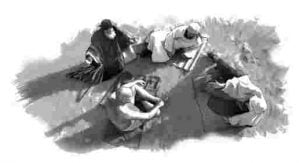The Curse Causeless – Teaching Plan
Key Thought: Even though Job’s friends saw his troubles as a result of a cause, Job was more concerned with asking the important question.
1. Have a volunteer read Job 2:11-13.
a. Ask class members to share a thought on what the most important point in this text is.
b.  Did Job’s friends show sympathy and concern over and about what most people might do?
Did Job’s friends show sympathy and concern over and about what most people might do?
c. Personal Application : Have you ever been comforted during pain or loss by another person? What did you learn from that experience that could help you in comforting someone else? Share your thoughts.
d. Case Study : One of your relatives states: “Wouldn’t it be better to be compassionate and sympathetic when dealing with those who are suffering, even through their own sins and misdeeds?” How would you respond to your relatives?
2. Have a volunteer read Job 4:1-7.
a. Ask class members to share a short thought on what the most important point is in this passage.
b. Can a person who seems like a rock to others in times of trial, faint and fall apart when it happens to them? Why is it possible?
c. Personal Application : Should we ever connect suffering with sin? When and in what circumstances? Share your thoughts.
d. Case Study : One of your friends states, “Isn’t it true that God promises to protect us – like in Psalm 91? So Eliphaz is talking about the cause and effect of sin. But why is this theology not true in Job’s case? Is Eliphaz right that the innocent haven’t perished or the righteous killed?” How would you respond to your friend?
3. Have a volunteer read Psalm 119:65-72.
a. Ask class members to share a short thought on what the main idea of this text is.
b. Is the Psalmist saying that trials and afflictions can be a positive thing at times?
c. Personal Application: Have you ever been able to look back at former trials and seen the good that has come out of them? Share your thoughts.
d. Case Study : One of your neighbors states, “I’ve had my share of afflictions and I can say with certainty that nothing good has come from them. I’m a survivor, but I don’t look forward to trials – they are all negative.” How would you respond to your neighbor?
4. Have a volunteer read Job 4:12-21.
a. Ask class members to share a short thought on what the main idea of this text is.
b. What kind of inspiration is Eliaphaz sharing with Job here? Is this the safest type of theology to hold onto?
c. Personal Application : What importance should we place on dreams or visions of the night in regards to our relationship to God and His Word? Share your thoughts.
d. Case Study : Think of one person who needs to hear a message from this week’s lesson. Tell the class what you plan to do this week to share with them.
(Truth that is not lived, that is not imparted, loses its life-giving power, its healing virtue. Its blessings can be retained only as it is shared.”Ministry of Healing, p. 148).
